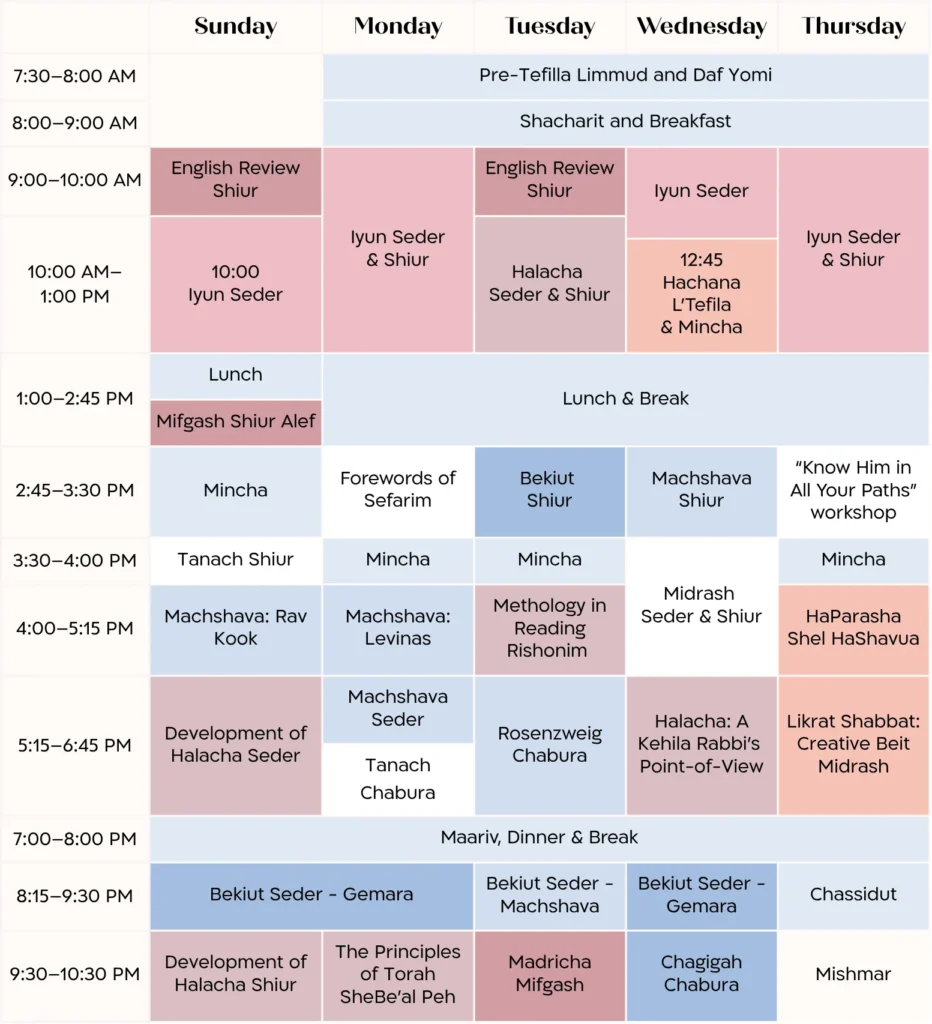Overseas Program
Take your place in the beit midrash
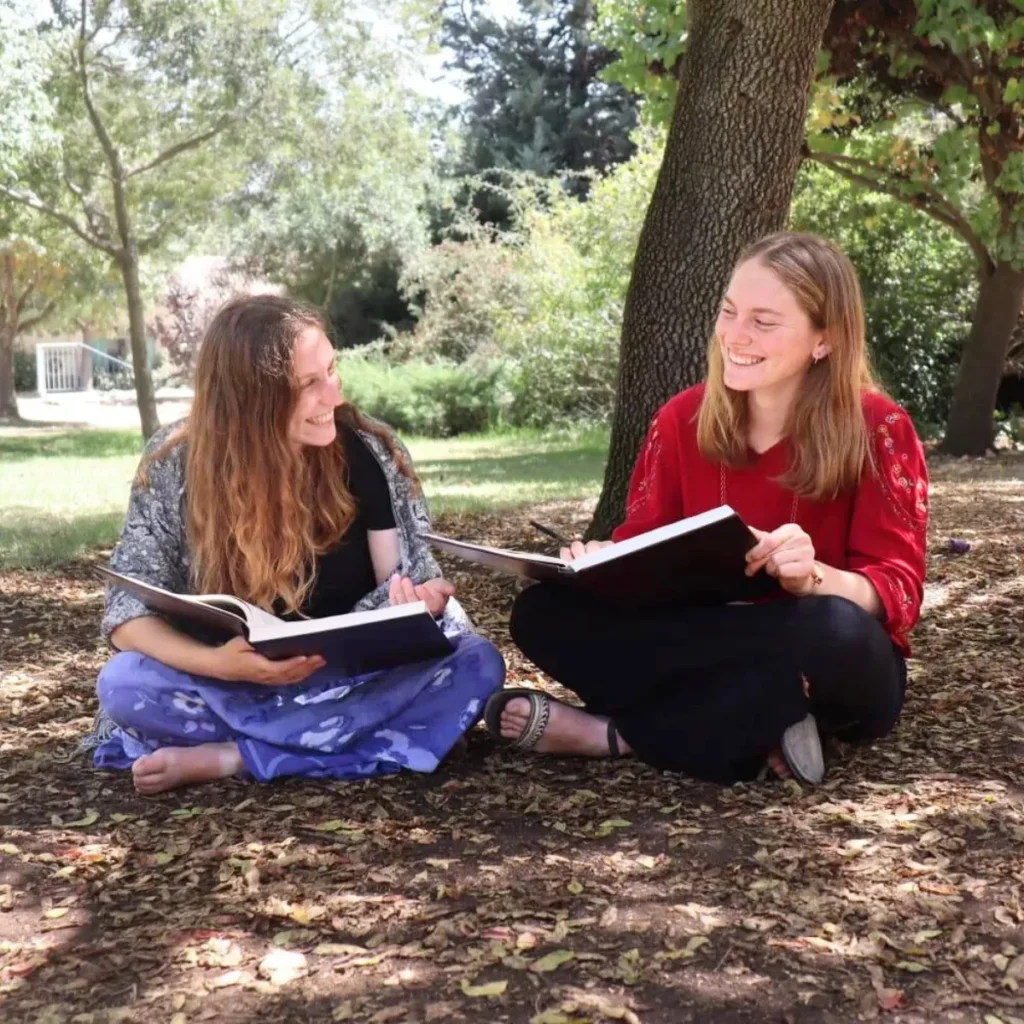
Shiur Alef students from overseas make up about one third of the Shiur Alef group, and are completely integrated with the Israeli students, who make up the majority of the Yeshiva community.
Overseas students live and learn with their Israeli counterparts in a Hebrew speaking environment, while being supported by their own English speaking staff, and having unique extra curricular programming throughout the year.
Students live in comfortable, newly renovated dormitories within the beautiful green grounds of Kibbutz Kfar Etzion, with access to laundry facilities and a fully equipped kitchen.
Why Should You Come
to Our Overseas Program?
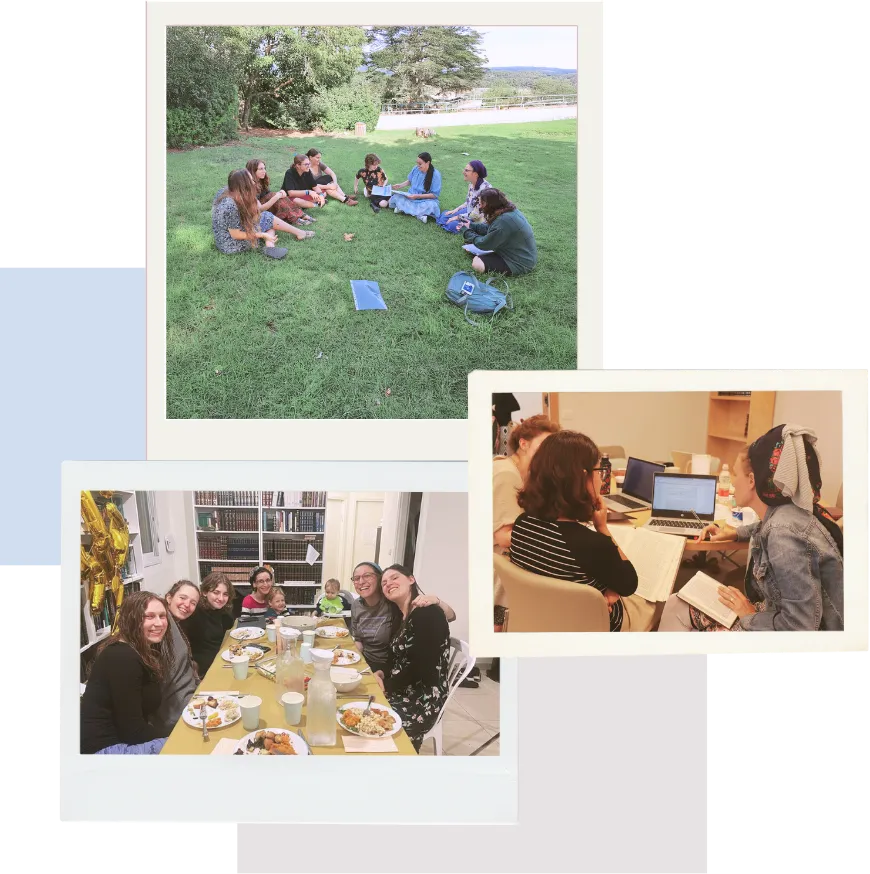
Personal Attention
- We are a small, intimate Beit Midrash community.
- Each student is personally mentored by Yeshiva staff to cultivate the development of strong skills and deep and nuanced understanding of the materials studied. This caring, pedagogical approach is core to our mission.
- Overseas students are supported by a dedicated, English-speaking staff, including the overseas program director, Eim Bayit and madricha.
- Overseas students have special programming, in addition to the general Yeshiva schedule, such as Bayit Cham dinners and tiyulim, all to enhance their Shana Ba'Aretz experience.
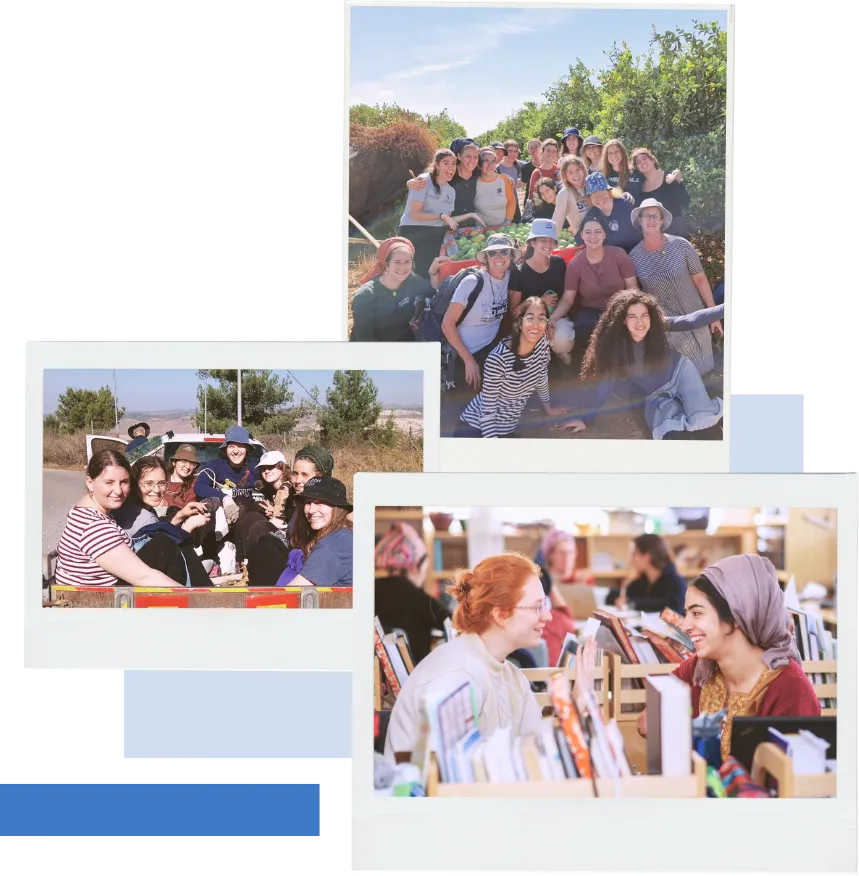
Integration
- Overseas students will have the opportunity to fully immerse themselves in the Yeshiva’s Israeli environment, while also being supported as overseas students.
- Students will be able to form tight-knit relationships with their peers and teachers by living and learning in one integrated program.
- All classes will be conducted in Hebrew, but there will be a regular review class for Gemara in English, and chavruta study can take place in any language. Each dormitory will house Overseas students and Israelis together.
- Many of the Israeli staff and students speak English, and are always happy to converse!
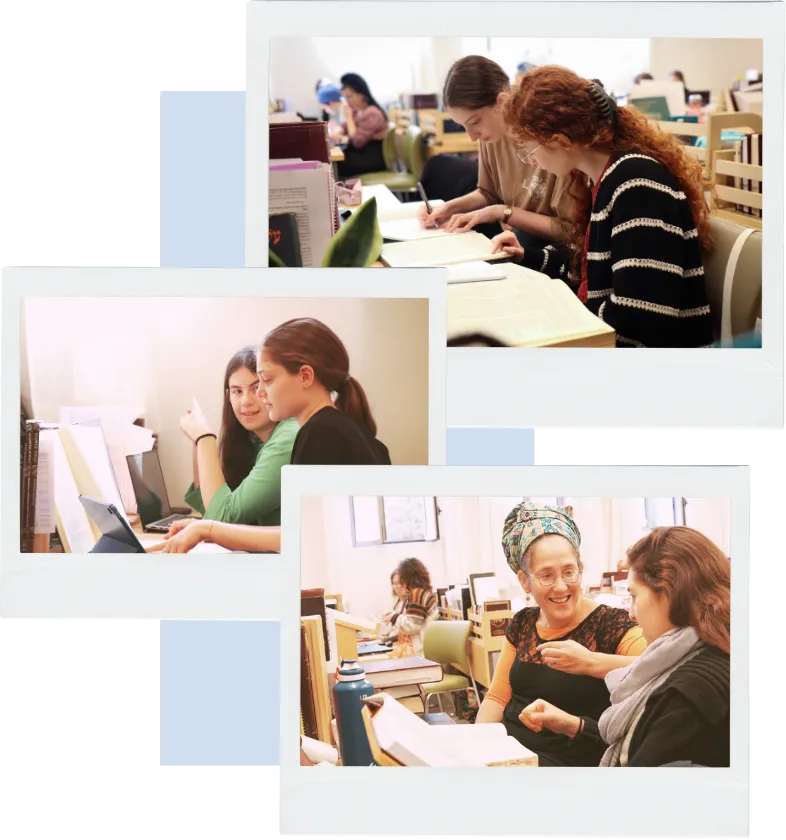
Unparalleled Learning
- Our Rosh Yeshiva and almost the entirety of our staff are female, and their deep and ongoing learning is a source of inspiration for all students.
- The curriculum in Yeshivat Drisha focuses on "classic yeshiva" sugyot, typically studied in men's yeshivot, which expose students to centuries- and millenia-old discussions, at the heart of what it is to be a Jew.
- We offer a Gemara curriculum of four sidrei iyyun and three sidrei bekiut a week. Many classes include seder as well as shiur, where students first prepare the sources b’chavruta in the Beit Midrash before reviewing and enriching their understanding in class.
- Advanced learners are the foundation of the Yeshiva and serve as role models to the younger students, modeling full-time Torah study as a life pursuit alongside family and other demands. The whole Yeshiva studies the same masechet each year, which fosters interactions and learning opportunities between students of all programs.
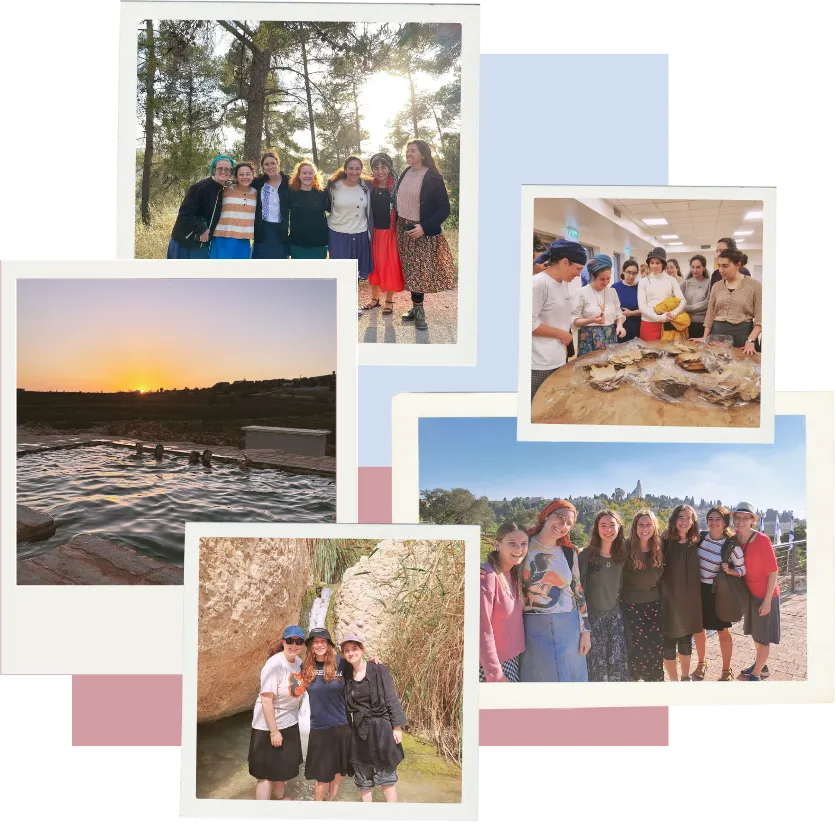
Programming
- Overseas students are offered tiyulim all around Israel, to both popular and off-the-beaten-path locations. Some tiyulim are day trips, and some are longer and last several days over Bein Ha'Zmanim.
- In-Yeshiva shabbatot occur once every two weeks. They always include special cooking, and are always attended by members of staff.
- Several chagim are celebrated in the Yeshiva, including Simchat Torah, Purim, Shavuot and Yom Ha'Atzmaut.
- Rosh Chodesh is a special time in the Yeshiva, with a festive tefila and brunch.

Location
- The Yeshiva is located within the beautiful green grounds of Kibbutz Kfar Etzion, in Gush Etzion.
- Our dormitories are located in a beautiful outdoor area of the kibbutz. Each dormitory unit houses two bedrooms and is shared between overseas students and Israelis.
- Each room is furnished with new beds and individual closets for each student. Each unit is equipped with a mini fridge and kettle.
- The Yeshiva provides three meals a day to all students. Students also have access to the Yeshiva’s student kitchen, which is equipped with a stove, oven, and microwave, as well as laundry services and internet access.
Frequently Asked Questions
The Application Process
How do I apply to Yeshivat Drisha?
Our application form includes important details we would like to know about you, as well as
some background about your Torah learning experience, and some short essay questions.
Our application fee is 50$.
Can I apply to the Yeshiva through the joint seminary application form?
No, application to Yeshivat Drisha is not included in the joint seminary form. We have our own form, which you can find right here!
Although we’re not on the joint application, we keep to the same schedule as other seminaries.
What's the deadline for submitting my application?
Applications for the 2026-2027 school year are due December 1st.
Do you require recommendations?
Yes! We would like to hear good things about you from two people who know you well. At least one of those should be a teacher or an administrator at your school.
I sent in my application! What happens next?
We will reach out to you by the end of December or the beginning of January to schedule a personal interviews, by Zoom or in person. You will have a conversation with Rabbanit Yael Shimoni, including a chavruta component – for which you don’t need to prepare anything!
When will I know if I was accepted?
After your personal interview with Rabbanit Yael Shimoni, you will receive your acceptance letter on February 15th, with some additional information on the upcoming year. You will have a week to send in your response and register.
Life at Yeshivat Drisha
Where am I going to live next year?
Yeshivat Drisha is located in Kibbutz Kfar Etzion, in the beautiful region of Gush Etzion, near Alon Shvut.
Our dormitories are small stand-alone apartments in a lovely outdoor compound, surrounded by greenery and trees. Each room is furnished with new beds and individual closets for each student, and equipped with a mini fridge and kettle.
Who will I be sharing dorms with?
Each dormitory unit houses two bedrooms and is shared between overseas students and Israelis, with a maximum of two girls per room and four girls per unit.
Are the dormitories used when students are not on the kibbutz?
No! This is your home for the year, and we won’t allow anyone else to use it.
Are dorms open year-round?
Dorms are open year-round, even when the Yeshiva is on vacation. Students can always stay in their dormitories for Shabbat and are always welcome at the Kibbutz shul for Shabbat tefillot and Kibbutz families for Shabbat meals.
What amenities will be available to me at the Yeshiva and in the dorms?
The Yeshiva provides three meals a day to all students. Students also have access to the Yeshiva’s student kitchen which is equipped with a large refrigerator, stove, oven and microwave, as well as complete sets of meat and dairy cookware and dishes.
Students also have full access to communal laundry machines, free of charge, which are conveniently located.
What's the food like at the Yeshiva? What if I have a special diet or allergies?
We believe strongly in the saying “נפש בריאה בגוף בריא” – a healthy mind in a healthy body. It’s important to us that the food we provide to our students is healthy and nutritious.
For breakfast, students are offered fresh bread, plenty of vegetables and fruit, and a variety of spreads, such as Israeli cream cheese (gvina levana), hummus or silan. Students are welcome (and encouraged!) to chop up a salad, and we make sure we always have plenty of cutting boards available for everyone.
Lunches always include an animal-based protein (like chicken or fish) and a plant-based protein (such as tofu or seitan), at least one veggie side dish, and fresh cut vegetables.
We are more than happy to accommodate special dietary needs and allergies. We currently offer gluten-free and vegan options, and can make other similar arrangements for students as needed.
Living in Kfar Etzion
What can you tell me about Kfar Etzion?
Founded in 1927 and reestablished in 1967, Kfar Etzion is a part of Gush Etzion, in the Judea hills to the south of Jerusalem.
Kfar Etzion is currently home to approximately 1200 individuals. It is a religious kibbutz, founded by members of Tenuat HaKibbutz HaDati (the Religious Kibbutz Movement), who were later joined by Bnei Akiva alumni, from Israel and abroad.
Residents at the Kibbutz are mostly Dati Leumi, and of a similar mindset to someone who’s Modern Orthodox. The Kibbutz is definitely happy and proud to host the first Yeshiva for women!
How is the Kibbutz protected and secured?
The Kibbutz is gated and is enclosed by a fence which is monitored 24/7. There is also private security who patrols nightly around the area of the Yeshiva dormitories.
Students are encouraged to join a Kibbutz security Whatsapp group, so they can receive all security updates and instructions immediately. There is a small army base located on the Kibbutz itself, as well as a larger one next door.
Is there anywhere I can go out to in the area? How will I get around?
Kfar Etzion is home to a bustling shopping area frequented by people from all over Gush Etzion, with a large grocery store, several restaurants, an ice cream parlor and a fitness center, to name a few.
There are direct buses to the Kibbutz from Jerusalem, Beit Shemesh and Efrat, as well as to Tzomet HaGush and the shopping mall there.
Financial Information
How much does the Drisha Overseas program cost?
The total cost of the program is $25,000 USD for the year.
This cost includes the non-refundable registration fee of $3,500 USD, tuition, room and board, and extra-curricular programming.
Needs-based financial aid is available.
Are there any additional costs?
Additional costs include international airfare from the student’s home location to Israel, health insurance, and cell phone plans or other SIM card arrangements. Health insurance premiums will be paid directly to Maccabi upon arrangement.
What about medical coverage in Israel?
Medical coverage is provided by Maccabi, and sign-up and payment is directly through them. We’re happy to help students set this up.
When is payment due?
- Registration fee – 3,500$ USD, due February 16th
- First semester fee – 11,597$ USD, due two weeks before the beginning of the program
- Second semester fee – 9,903$ USD, due two weeks before the beginning of the second semester
Are there any financial accommodations available?
Individual payment plans can be determined on a needs basis. Additionally, financial aid is available on a needs basis.
